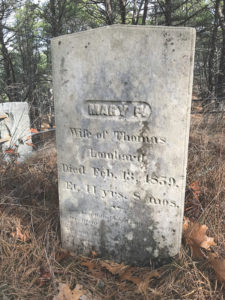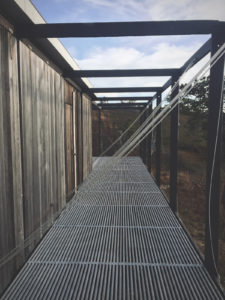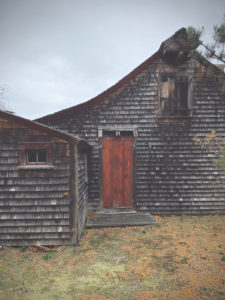WELLFLEET — The dept. of public works expects to complete construction on a project to raise a section of Old County Road leading to Bound Brook Island by Memorial Day. In recent months, salty overwash from Duck Harbor has rushed onto Old County, Pamet Point, and Coles Neck roads, cutting off 11 properties on the island from the rest of town.
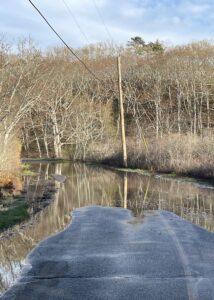
According to an update posted on the town’s website on May 11 by DPW Director Jay Norton, his department expects to have the necessary permits to begin work by May 20.
Norton, along with interim Town Administrator Tom Guerino, has been working with the Canada-based global engineering firm WSP since April 22 on a plan for the project after flooding in late March trapped Bound Brook residents for over a week.
“It seems scary to be isolated out there for so many days of the month,” Penelope Jencks, 88, wrote to Norton on April 12. Jencks had been trapped overnight on the island after sudden flooding cut off egress on Jan. 13. “The fire department’s little rubber raft was an amusing help in January,” she wrote, “but if someone has a serious emergency, it could be a tragedy rather than an adventure.”
High tides and strong winds have sent seawater streaming into Duck Harbor since 2021, when waves first breached the dunes along the shore. Further erosion of the dunes, along with consistent high tides over 10 feet, has meant that the flooding is beginning to encroach farther inland, reaching critical infrastructure in the area.
Since January, regular flooding during high tides has meant that “part of every month Bound Brook is inaccessible,” said Peter McMahon, director of the Cape Cod Modern House Trust, which manages the Hatch house on the island.
The flooding has not dissipated as summer approaches. Norton wrote in an update on the town website on April 12 that since the March flooding, the DPW has received calls that water levels “have increased dramatically all the way to Black Pond Road far upstream on the Herring River.” Based on tide charts for the summer months, “I don’t believe there will be any relief,” Norton said.
Norton told the Independent that flooding this month has not been as severe as it was in March and April because weather conditions have calmed. “We still notice flooding even with no storm activity during higher tides,” Norton said.
Residents of the island have said they’re worried about safety but also about the economic effects of the flooding. “Those of us who have rented our property in the summer months cannot depend on tides,” resident Lisa Campbell told Norton in an April 17 email. Homeowner Heather Strauss said she rents her house in July and August and worries that the flooding will cut into her season. The Cape Cod Modern House Trust has postponed its May reservations for the Hatch house and will start its season in June, McMahon said. Revenues from rental of the trust’s restored houses help fund restoration and maintenance at the historic properties.
Norton has said previously that there is no evidence that the Herring River Restoration Project has made the flooding worse. In fact, restoration of the Herring River could help solve the problem long-term, project coordinator Carole Ridley told the Independent in March. The restoration could aid the drainage of flood water, which is now trapped because of narrow culverts along the river’s floodplain and failing tide gates at the Chequessett Neck Road dike.
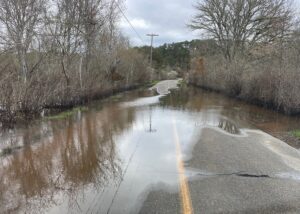
Norton said that raising a stretch of Old County Road should be an immediate fix to the flooding that began in the winter. Other remedies, like reconstructing a barrier at Duck Harbor Beach, have been considered, Norton said. But they were not practical “due to the amount of time to study the environmental risks/benefits, engineering design, construction costs, and permitting,” Norton told Bound Brook Island residents in an email on April 12.
The town’s plan does not preclude ongoing work to raise several roads in the area, which is slowly progressing as part of the Herring River Restoration Project, according to a Feb. 16 update on the Friends of Herring River website.
The DPW is tackling this project “in house” because it will be faster and cheaper than a normal bidding process, Norton said in an update on the town website. “It is going to be a stretch for our department, but we have thoroughly and thoughtfully vetted this out and are confident we can get this work done.” Norton told the Independent that the department has the necessary machinery and materials to do the work.
If the town were to put the project out to bid, the work, from choosing a contractor to completion, would likely not happen before July 4, Norton said.
The DPW is currently working with the town’s conservation dept. to acquire emergency permitting for the project and will notify the state Dept. of Environmental Protection once a permit is in hand.
“A scoping session with all the applicable regulatory agencies has been conducted so everyone is aware this is coming,” Norton said.
